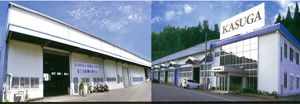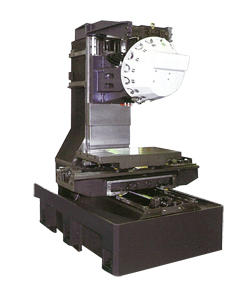Kasuga Seiki Turns Taiwan's Machine Tool Strength to Its Advantage
Setting up plant in Taiwan allows global deployment from Greater China
2013/09/10 | By Ken LiuWhen machine-tool maker Kasuga Co. of Japan decided to open its first overseas workshop around one year ago, it chose Taiwan over China on the advice of Jackson Wong, a Hong Kong citizen operating for more than 10 years as machine trader before becoming chairman of the Taiwan subsidiary, Kasuga Seiki Ltd.

“Compared with China and most of its neighbors, Taiwan is better located for Kasuga,” Wong recalls, adding that the advantages include longer history in machine-tool development, excellent mechanical capability, sound components supply chain, sufficient labor force, adequate land supply, Japanese-style management, and proximity to China, world's No.2 economy.
“Opening the factory in Taiwan allows Kasuga to tap the local market and develop global presence from Greater China, hence adding more value to the investment in Taiwan than in China,” Wong stresses.
Kasuga is a midsized Japanese machine-tool maker known for massive machines. Boeing is one of the Japanese manufacturer's primary customers, having adopted around 200 Kasuga heavy-duty, five-axis machining centers. “Kasuga's strategy stresses making high-precision, durable, less-expensive, and reliable machines as well as steady improvement,” Wong says.
Stubbornly high yen-to-greenback rate and rising production cost in Japan, Wong notes, are hurting competitiveness of Japan's machinery industry, forcing Japanese machine makers like Kasuga to go abroad. “Many Japanese manufacturers traditionally depending on Japan-built machine tools have gone overseas looking for low-cost resources to start a snowball effect, attracting other Japanese peers into clusters,” he says.

Overseas for Long-term
In spite of the recent devaluation of the yen, Wong feels that overseas Japanese manufacturers are not likely to move back home. “They would rather stay overseas to buy more valuable currencies when the yen is losing value for future expansion investments,” he says.
In normal development the Japanese manufacturers, Wong says, have begun sourcing production equipment from non-Japanese manufacturers. “However being in business with Japanese capital and technology still helps my company to be prioritized by these Japanese makers as suppliers.”
Backed up by parent company's technology, the Taiwan subsidiary has released 11 machines, including two types of CNC drilling & tapping machine, six types of vertical machining center, and two types of five-axis machining center. However, Kasuga Japan is not the only technology source, the Taiwan company works with the Hong Kong University of Science and Technology on five-axis laser machining center.
According to Wong, his company's machines are ideal for cut mobile phone housings and vehicle parts, noting that the machining center has mostly replaced electric discharge machine (EDM) for precision metal fabrication, usually done with precision molds cut by EDMs. “That's because cutters now have improved immensely in precision yet become more affordable. Besides, the mold industry is on wane,” he says.
The company's machines have penetrated the iPhone supply chain, according to Wong. “iPhone's fine aluminum housing now can be finished by machining centers. We feel that hybrid machine tools might become redundant should iPhone-housing manufacturing model emerge as mainstream in high-end manufacturing,” Wong says.
The company's machines, according to Wong, have precision tolerance of two micrometers, with 12,000 RPM capability. “Around 20 years ago, the machines could make 8,000 RPM at best,” he recalls.
While continuing to ship machines back to Japan, the company, Wong reports, has received increased orders since the beginning of this year from Southeast Asia and China, adding that China's machine-tool market to begin rallying this year after nearly one year of stagnation in anticipation that Beijing will loosen credit policy this year as economic stimulus.
With easier access to bank loans, foreign manufacturers and China's private manufacturers along coastal provinces, Wong thinks, will mostly purchase production equipment from overseas suppliers rather than locals. Nevertheless, Wong admires the quality of the heavy-duty machines for special purposes such as making huge components for undersea oil rigs that China's state-run enterprises build.
In the global machine-tool market, Taiwan, Wong points out, is known for supplying mid-range products, qualitatively superior to China's but inferior to that of South Korea, Europe and Japan. “In the TIMTOS or Taipei International Machine Tool Show this year we saw more western buyers than two years ago who sourced Taiwan-built machines, which are qualitatively similar to western machines yet more cost effective,” he says.
Wong says that Taiwan's machining-center industry is superior to South Korea's in production scale and competitiveness but its turning-machine industry has lost out to South Korea's. “South Korea's massive car-making and shipbuilding sectors underpin its turning-machine industry,” he explains.
As the company's management team is made up of specialists involved in the machine-tool industry on average 20 years, the company knows well customer needs and expectations. “That's why we can introduce 11 models of machine in less than 10 months with each specially built,” Wong concludes.




